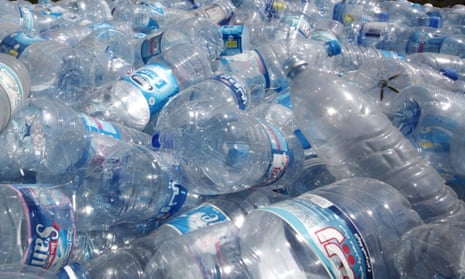The Ontario government has proposed a two-year moratorium on the creation or expansion of bottled water operations fed by groundwater in the Canadian province, in a bid to strike a balance between a burgeoning bottled water industry, a growing population and the effects of climate change.
The province vowed to take action earlier this year after a severe drought prompted questions over regulations that allowed bottled water to draw millions of litres a day of water from the province.
“Water bottling is a different kind of industry and we need to treat it differently,” Kathleen Wynne, Ontario’s premier, said as she promised to update the government’s policies. “Thirty years ago, we wouldn’t have envisioned an industry that took water and put it in plastic bottles so that people could carry it around.”
On Monday, officials said the proposed moratorium would offer them time to gain a better grasp on the current state of groundwater supplies in Ontario and ensure the province has the resources needed to meet the dual challenges of climate change and increasing population.
“With a changing climate, and specifically with the impacts from drought and increasing population growth, we want to work with the people of Ontario to make sure we are properly protecting this vital resource,” said Glen Murray, Ontario’s minister of the environment and climate change.
The regulations also seek stricter controls on existing bottled water operations, including shortening the duration of permits that are handed out, from 10 years to five years, and imposing mandatory reductions during times of drought.
The suggested changes, which are open to public comment for the next 45 days, will be paired with an evaluation of the prices currently being charged to bottled water companies. Right now the province charges C$3.71 for every million litres of water, along with a permit fee of up to C$3,000 depending on the risk of environmental impact.
The growing tension between bottled water companies and local communities seeking to shore up their water supply was laid bare last month after authorities in a small, fast-growing southern Ontario township said Nestlé, the food and drinks multinational, had purchased a spring water well the township had been eyeing.
Monday’s proposed changes mean Nestlé will have to wait until 2019 to test the quality and quantity of the water in its newly acquired spring water well. On its website, the company noted that the well was purchased to supplement other operations in the region, as well as support future business growth. Nestlé Canada currently has permits that allow it to extract up to 4.7m litres of water a day from sources in Ontario.
On Monday, Nestlé said it welcomed the proposed regulations. “We as a company – and our hundreds of employees in south-western Ontario – are pleased with the direction the government is taking,” the company said in a statement. “We will continue to work with local and provincial governments, environmental agencies and community groups, our employees, as well as local residents on a thorough approach to water resource management to ensure the community’s needs come first.”
The government’s proposal was also welcomed by Environmental Defence, one of the many groups that has been calling for stricter regulation of the bottled water industry. “Climate change and population growth mean that Ontario’s water is going to be under increasing stress in the years ahead,” said Keith Brooks of the group. “The government is right to single out water bottlers and to take action to protect water.”
The group was hopeful that the changes would help ensure the community, agricultural and ecosystem needs were prioritised over those of water bottlers and suggested the government could also introduce measures to address the up to one billion plastic bottles that end up in Ontario landfills, streets and rivers each year.
The group also highlighted the government’s willingness to evaluate its pricing for the bottled water industry. “We look forward to the discussion on the low fees charged to water bottlers,” said Brooks. “The C$3.71 per million litres currently paid by water bottling companies is laughable.”

Comments (…)
Sign in or create your Guardian account to join the discussion